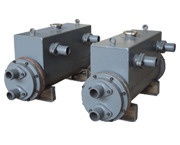Marine Cooler Heat Exchangers
Product Description
Tipo Marine cooler heat exchangers are the most common way to cool a boat’s engine, using the lake, river or ocean water in which the boat floats. This high quality of marine Cooler heat exchanger has copper-nickel tubes and end caps to resist corrosion and marine growth. Only the closed circulation coolant contacts the aluminium alloy body. This is a great unit to replace your old, rusted, leaking or clogged heat exchanger or for use in a new installation. It consists of a set of corrugated metal plates, rubber gaskets and frame. This anode must be periodically replaced as part of regular maintenance. Because the water the boat floats in may be contaminated with floating particles such as wood or other detritus most boats will have a filter (often stainless steel mesh) to remove these particles before they flow through the heat exchanger. This filter must be periodically cleaned or else the flow of water to the heat exchanger will become obstructed and the engine will overheat.
FUNCTIONS Marine Cooler Heat Exchangers:
- There are three methods employed for water-cooled marine petrol and diesel engines they are
Direct cooling: Direct cooling of the cylinders and heads by sea-water is unsatisfactory, because the engine – which was probably originally designed for radiator cooling – will run too cold and the sea-water will eventually run the cylinder block and heads.
Heat Exchanger Cooling: Heat exchanger cooling is the most common method, the seawater being isolated in components which can be designed to withstand its corrosive effect. The closed fresh-water circuit can be thermostatically controlled so that the engine operates at its design temperature.
Keel Cooling: Keel cooling is suitable for small boats operating in shallow weedy water, but the need for pipe work external to the hull is a severe limitation.
FEATURES:
- With corrugated tubes, this marine oil cooler heat exchanger ensures high viscosity oil with good flow velocity inside of the unit.
- These features made this marine oil cooler efficient and cost effective on water to oil cooling system.
Applications:
- Gear Oil Coolers
- Fuel Coolers
- Hydraulic Oil Coolers
- Diesel Fuel Return Coolers
- Lube Oil Coolers
Advantages of inter cooler/ after cooler:
- High heating efficiency for oil cooling
- Compact size
- Easy installation
- Stainless steel 316L or titanium shell & tubes.
- Various connectors for connection.
- Low Density and High Strength
- Excellent Corrosion Resistance
- Good resistance to effect of heat
- Excellent Bearing to cryogenic property
- Nonmagnetic and Non-toxic
- Good thermal properties
Images:


